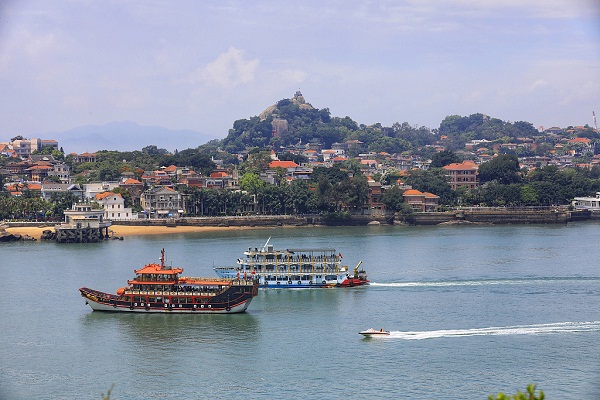

Gulangyu Island in Siming district of Xiamen has been listed as a UNESCO World Heritage site since 2017. [Photo/CFP]
Xiamen, located on the southeastern coast of China, is known as "a garden on the ocean". The city bears elements of Minnan (southern Fujian province) and Western culture and is home to many overseas returnees to China, which endow it with a unique atmosphere, landscapes, and history.
Traditional handicrafts, such as bead embroidery and lacquer thread sculptures, have been passed down from ancient times, while folk customs like Bobing Game and the Wangchuan ceremony evoke the historical memory of ancestors and reshape social connections when celebrating big moments or confronted with emergencies.
At the same time, historical buildings across the city, such as those on Gulangyu Island and Zhongshan Road, represent a variety of local and international architectural styles and enable the city to embody China's spirit of openness and inclusiveness.
World Heritage Gulangyu
Gulangyu Island, known in the local dialect as Kulangsu, is commonly mentioned when people talk about Xiamen.
A quiet and beautiful islet in the southwestern corner of Xiamen Island, Gulangyu has witnessed clashes of culture and integration between the East and West since Xiamen first opened to foreign trade in 1844.
A total of 931 historical buildings, along with a variety of local and international architectural styles, natural scenery, historic roads, and gardens turned the 1.83-square-kilometer space into a "World Building Expo".
Many historical relics and natural scenic spots are still well-preserved on the island, making it an exceptional example of flourishing cultural fusion.
Being at the center of Sino-foreign exchange activities since the beginning of the 20th century, Gulangyu is not only a world heritage site, but also an urban community shaped by people who have lived there for generations, said Shahbaz Khan, director of the UNESCO Cluster Office in Beijing.
He made the remarks at the China-France Dialogue: Mutual Learning Between Chinese and French Civilizations – Protection, Inheritance and Utilization of Gulangyu, which was held on the island in April. He added that the island has witnessed the endeavors and pursuit people have made across time and space.
The local authority started seeking UNESCO intangible cultural heritage status in 2008. On July 8, 2017, Gulangyu became the 52nd Chinese site to make the list.